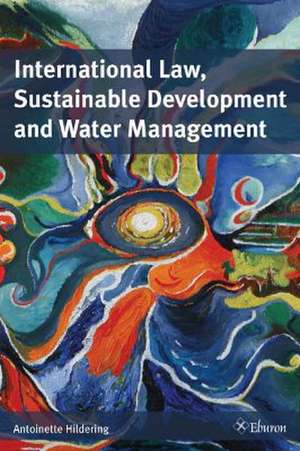International Law, Sustainable Development and Water Management
Autor Antoinette Hilderingen Limba Engleză Paperback – 2006
Water covers about three-fourths of the earth's surface. Still, over one billion people do not have access to clean drinking water—a problem that many governments across the globe seem unable to redress. International Law, Sustainable Development and Water Management explores the political issues inherent in global water management, analysing water as a social, economic, and ecological good, and then applying the principles of international law to resource development policies. Antoinette Hildering's proposed framework for change, "Guardianship Over Water," offers policymakers practical guidelines for water management at a local, national, and international level.
Preț: 222.18 lei
Nou
Puncte Express: 333
Preț estimativ în valută:
42.51€ • 44.48$ • 35.32£
42.51€ • 44.48$ • 35.32£
Carte indisponibilă temporar
Doresc să fiu notificat când acest titlu va fi disponibil:
Se trimite...
Preluare comenzi: 021 569.72.76
Specificații
ISBN-13: 9789059720558
ISBN-10: 9059720555
Pagini: 248
Dimensiuni: 152 x 229 x 15 mm
Greutate: 0.45 kg
Editura: Eburon Academic Publishers
Colecția Eburon Academic Publishers
ISBN-10: 9059720555
Pagini: 248
Dimensiuni: 152 x 229 x 15 mm
Greutate: 0.45 kg
Editura: Eburon Academic Publishers
Colecția Eburon Academic Publishers
Notă biografică
Antoinette Hildering is the author of several publications on achieving sustainable development through international law and water management.
Cuprins
List of abbreviations
Table of treaties
Preface
1. Introduction
1.1 The problem
1.2 Water and international law: the research questions
1.3 The scope
1.4 The methodology
1.5 Book outline
Part I. Setting the scene
2. Uses of freshwater resources
2.1 Water
2.2 Social uses
2.2.1 Domestic uses
2.2.2 Food production
2.2.3 Cultural Uses
2.3 Economic Uses
2.3.1 Industrial Uses
2.3.2 Transport
2.3.3 Hydropower
2.4 Ecological uses
2.4.1 Aquatic ecosystems
2.4.2 The hydrological cycle
2.4.3 The world ecosystem
2.5 Conclusions
3. Sustainable development in international law
3.1 The status of sustainable development
3.2 International law on sustainable development
3.2.1 Human rights
3.2.2 International development law
3.2.3 International environmental law
3.3 International water law
3.3.1 Evolution of international water law
3.3.2 Equitable and reasonable utilization
3.3.3 Sustainable development in international water law
3.4 Trends in favour of sustainable development
3.4.1 From fragmentation toward integration
3.4.2 From delimitation toward cooperation
3.4.3 From state interests toward common interests
3.5 Conclusions
Part II. Water within the pillars of sustainable development
4. Water as a social good
4.1 Access to water
4.2 A human right to water
4.2.1 The right to a healthy life
4.2.2 The right to an adequate standard of living
4.2.3 Participation
4.3 Eradicatoin of poverty
4.3.1 Capacity-building
4.3.2 Social groups
4.3.3 Good governance
4.4 Equity
4.4.1 Intra-generational equity
4.4.2 Intergenerational equity
4.4.3 Equity between species?
4.5 Conclusions
5. Water as an economic good
5.1 Control over water
5.2 The right to use water
5.2.1 Ownership of water
5.2.2 Sovereignty over water resources
5.2.3 Priority of use?
5.3 Management of water
5.3.1 Private management
5.3.2 Community management
5.3.3 Public management
5.4 A supportive and open international economic system
5.4.1 International trade in water
5.4.2 The WTO and NAFTA
5.4.3 Investment in water
5.5 Conclusions
6. Water as an ecological good
6.1 Protection of water
6.2 Duty to protect water
6.2.1 Increased demand
6.2.2 Replenishment rate
6.2.3 Environmental impact assessment
6.3 Protection of the environment
6.3.1 Protection of ecosystems
6.3.2 Combating pollution of water
6.3.3 Alien or new species
6.4 Ecological integrity
6.4.1 Catchment basin approach
6.4.2 Marine environment
6.4.3 Interdependency
6.5 Conclusions
Part III. Balancing the pillars of sustainable development
7. Water as a social, economic and ecological good
7.1 Balance of interests
7.2 Social-economic: development through water
7.2.1 The right to development
7.2.2 The right of self-determination
7.2.3 Common but differentiated responsibilities
7.3 Social-ecological: life support by water
7.3.1 The right to a healthy environment
7.3.2 The precautionary principle
7.3.3 Eco-justice
7.4 Economic-ecological: sustainable use of water
7.4.1 The polluter and user pays principle
7.4.2 The no-harm principle
7.4.3 Common heritage or concern of humankind
7.5 Conclusions
8. Guardianship over water
8.1 Sustainable development of water
8.2 Key concepts combining principles by pillars
8.3 Framework on guardianship over water
8.4 Operationalisation of the framework
8.5 Conclusions
Annex I. Principles per policy-level
Annex II. The price of water
Bibliography
Index
